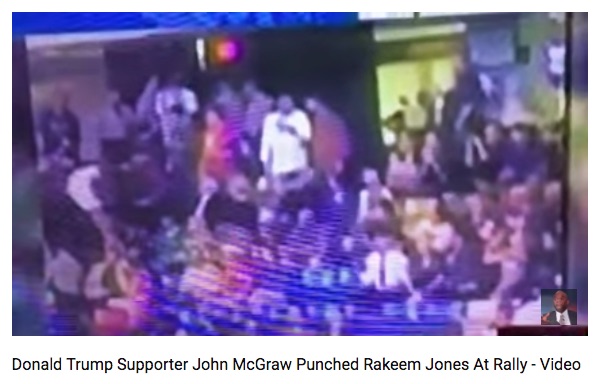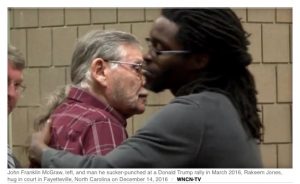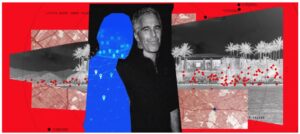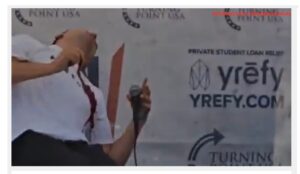DC Dave Martin
The Fayetteville “Sucker Puncher’s” Last Stand
On Wednesday, December 14, 2016, the “Trump supporter” who delivered an unsuspected “sucker punch to the face” of a “protestor” being led out of a Trump rally back in March finally had his day in court. Here is how The Washington Post reported it:
Man at Trump rally is sentenced to probation
John Franklin McGraw, who elbowed and threatened a protester at a rally for then-presidential candidate Donald Trump earlier this year, was sentenced to 12 months of probation Wednesday, resolving one of the first violent clashes in a historically tense presidential campaign that deepened racial and political divisions across the country.
McGraw’s threats and assault of Rakeem Jones, 27, captured in a viral video, became a flash point in the presidential campaign and focused attention on the raucous atmosphere at Trump rallies. In the video, McGraw, 79, speculated whether Jones was a member of a “terrorist organization” and wondered whether “next time, we might have to kill him.”
McGraw pleaded no contest to charges of misdemeanor assault and disorderly conduct. An additional misdemeanor charge of communicating threats was dismissed. Although the case took on racial overtones because McGraw is white and Jones is African American, McGraw’s attorney, James C. MacRae, said McGraw’s actions were not motivated by racial animosity.
“I’m extremely sorry this happened,” McGraw told Jones during a hearing in Cumberland County District Court in Fayetteville, N.C. “I hate it worse than anything in the world.”
McGraw shook hands with Jones, and the pair hugged as the courtroom erupted in applause.
“As far as race, not one time throughout this whole six months have I mentioned his race. I got hit by a man, period,” Jones said. “As far as race, I don’t know. It’s not my concern. I got hit by a man.”
Up to the very last day before the November 8 presidential vote, Hillary Clinton’s campaign in her commercials in the vital swing state of North Carolina was continuing to show clips of 78-year-old John Franklin McGraw “sucker punching” Rakeem Jones, the “protester,” as Jones was being led out of a Donald Trump rally in Fayetteville by sheriff’s deputies. It took a certain amount of brazenness on the part of Hillary’s troops to continue to publicize the faux violent encounter after the revelations by the Project Veritas organization that it was a common practice of operatives paid by the Clinton campaign to pay people to be disruptive at Trump’s extraordinarily popular rallies in order to foster altercations like the one that took place in Fayetteville.
The Professional-Wrestling Punch
There was ample reason to be suspicious of what transpired, as I wrote back on March 16, 2016:
Closer examination of the video reveals that the elderly, pony-tailed man appears not to have punched the young black man in the face, at all. Rather, he struck him intentionally only with his forearm in the upper part of the body near the younger man’s face. It looks like a glancing blow administered for maximum show but to little effect, sort of like what we see in professional wrestling matches. In a related article The Post reveals that the older man, John McGraw, an Air Force veteran, has been a “cowboy action” reenactor. A 2009 article from the mountain town of Hendersonville, NC, about McGraw is still more revealing. We learn that he is an Air Force veteran, that he had been a serious boxer in his youth, that he has deep and old ties to Las Vegas, where he was a friend of Sammy Davis, Jr., among a number of celebrities, and that at the time of the article he was still working as a sham gunfighter in wild west reenactments. One can easily imagine that he has engaged in sham fistfights as well for the entertainment of tourists.
All my focus at that time and in a follow-up article, however, was on the “attacker,” not just because of the apparent phoniness of his all-show-and-no-blow “sucker punch” (which The Post and all the media called it at the time, not an “elbow”), but also because of the over-the-top, ridiculous nature of what he said in quite measured tones to the on-the-spot reporter for Inside Edition in an interview after the rally. In retrospect, it is clear that we all should have been equally as suspicious of Rakeem Jones, the “protester,” and his three accomplices.
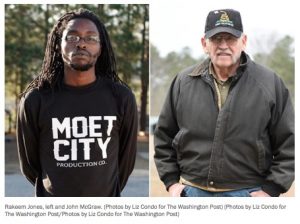
Here we get to watch Lawrence O’Donnell of MSNBC on the day after it happened attempting to squeeze the last possible drop of anti-Trump and anti-Trump-supporter sentiment out of the episode that he can as he interviews Jones and Ronnie Rouse, who was with Jones at the event. Maybe my perception is now too much colored by what we have learned about the Clinton camp paying people to disrupt Trump rallies and provoke altercations, but of the three people we see, Jones appears to me to be the least upset at what happened to him the night before. He also strikes me as the sort of person who is unlikely to have been so strongly motivated politically that he would have chosen to produce the sort of public unpleasantry that he did in the absence of some other inducement, say, like some handsome financial compensation. Here we get a further impression of Jones from CBS North Carolina as someone a bit more pleased with himself than upset at what had transpired the night before.
Jones and his seemingly ill-suited music-producer buddy (or handler) Rouse were apparently so pleased with how well things went at the March Trump rally that according to an August 8, 2016, Fayetteville Observer article, they, unlike McGraw, were all set to attend the next one that night in Fayetteville, this time with eight more people in their group. Even Jones’s lawyer realized that that wouldn’t look good when Jones is claiming “the effects of being assaulted have had an impact on him mentally and physically.”
Lawyered Up
But what’s this about Jones’s lawyer, anyway? Lawyers cost money. Rakeem Jones was never charged with anything, and with that hug-and-make-up scene at McGraw’s sentencing, I think we can safely say that no civil suit is in the offing. I think we might fairly ask who paid for that lawyer or, at least, where the money came from to pay for him.
While we’re on the subject of lawyers and their costliness, when the story first broke of McGraw’s arrest we were told that he was being held in custody, unable to ante up the rather modest sum of $2,500. It’s pretty clear that McGraw is not a man of means. In a March 25, 2016, interview by the Fayetteville Observer he says that he doesn’t even have a radio or a television. A photograph with the following caption accompanies the article: “John McGraw stands outside his camper, where he lives in Linden.” * From what you can see of the camper, it looks like a very modest one. But in the July 12 Fayetteville Observer we find this explanation for why the trial can’t take place in anything like a timely matter:
Defense lawyer James C. MacRae Jr. on June 30 requested the delay on behalf of 79-year-old John Franklin McGraw.
“Attorney needs additional time to investigate case to prepare his defense,” McRae’s filing says.
Could anyone possibly believe that excuse? It’s a very simple case, one for which a lawyer is hardly even needed. As we have said, lawyers cost money and the longer the case is strung out the longer the lawyer’s meter runs. It’s pretty clear that McGraw is not rich enough and it’s hard to believe that he is stupid enough to waste what little money he has in that way.
Pre-Election Reality Show
The key words in the article, it appears to me, are, “until after the elections.” We can see from the little love-fest that they performed at McGraw’s trial that he and Jones were feeling strain staying in character, one as a Trump-loving, racist hothead and the other as a political zealot motivated to bait Trump supporters just for the fun of it. But had the trial taken place before the election that is what they likely would have had to do. One need look no further than a McClatchy News Service piece that appeared in the Raleigh News and Observer (buried away on their web site. Apparently nothing appeared about the trial in the print version of this newspaper that dominates Eastern North Carolina.) to get an idea of McGraw’s true nature:
…on Wednesday, McGraw said he would have acted differently in another setting.
“If I met you in the street and the same thing occurred, I would have said, ‘Go on home. One of us will get hurt,’” McGraw added, according to WRAL. “That’s what I would have said. But we are caught up in a political mess today, and you and me, we got to heal our country.”
McGraw then shook hands with Jones, and the two hugged.
“It just felt good being able to shake his hand…and face him,” Jones said later, according to WNCN.
More accurately, McGraw might have said, “You and me, we needed the money.”
John Kerry received 1,525,844 votes in North Carolina in 2004 and lost badly to the incumbent George W. Bush. Just four years later Barack Obama got 2,142, 651 votes, an extraordinary 40% increase, and narrowly edged John McCain in the state. There is little doubt that many of those new Democratic voters came from an energized black populace, and the same story played out in many other states like North Carolina with large black populations. Democratic strategists realized that with a candidate like Hillary Clinton there was a real danger that black voters would fall back into the same slough of apathy that contributed to Kerry’s defeat by a weak opponent. The attempt to paint Trump and his supporters as anti-black racists was a reflection of the Democrats’ vital need to get blacks to vote.
That need to energize black voters explains to a degree the great effort by Hillary’s campaign and the compliant media like The Washington Post to paint Trump as a racist. The slender reed upon which it was based was Trump’s anti-immigration position and his support by likely phony “white supremacists.” In reality, there is no good reason why his anti-immigration and anti-trade-deal position should not have resonated with American blacks even more than it did with Trump’s white base, because a higher percentage of blacks are among the working class whose circumstances have been worsened through competition with desperate foreigners.
What took place in Fayetteville should be understood within that context, as I wrote back in late March:
The white-on-black assault at the Fayetteville rally fits the media narrative almost too well, which is why they would play it up, and is also a big reason to suspect its authenticity. One might contrast it with what happenedat a Trump rally in Tucson, Arizona, a few days later. There a powerfully built young man administered a brief but serious beating to a disrupter decked out in a cut-up American flag and accompanied by a person mockingly wearing a Ku Klux Klan hood. In that instance, though, the attacker was black and the absorber of the punches and kicks was white. It was clearly the real thing, an act of spontaneous outrage by a man who turned out to be an Air Force staff sergeant on active duty at a nearby base. It didn’t fit the “racist” narrative, though, so we hear little about it.
Looking at it with the Project Veritas light shown upon it, one might conclude that the Tucson disrupter, in terms of the price he paid, more than earned his money. In terms of what they accomplished, though, McGraw and Jones clearly were the better bargain. With the media’s ample assistance they did help imprint upon the minds of a lot of people the rather absurd notion that the election was a white vs. black affair, and black and liberal voters were sufficiently energized that Hillary Clinton received 2,189,316 votes in North Carolina, surpassing even the 2,178,388 that Obama had received in 2012. Unfortunately for Clinton, though, the “unpopular” winning Trump got 2,362,631 votes in the Tar Heel State, while the winning Mitt Romney had received only 2,270,395 there in 2012.
As a final note, I can’t help but point out the irony of the indisputable fact that the most likely people to accept the authenticity of the “sucker punch” thrown by McGraw would be the self-satisfied sophisticates of the type who regularly watch the Public Broadcasting System or listen to National Public Radio. These are the same people who take superior pleasure in laughing at the unwashed masses who think professional wrestling is real.
* In my article “On the Trail of the Fayetteville ‘Sucker Puncher’” I present evidence that suggests that this camper might not be McGraw’s full-time residence. He seems also to have a more permanent residence in the mountain town of Galax, Virginia.
David Martin
December 22, 2016
